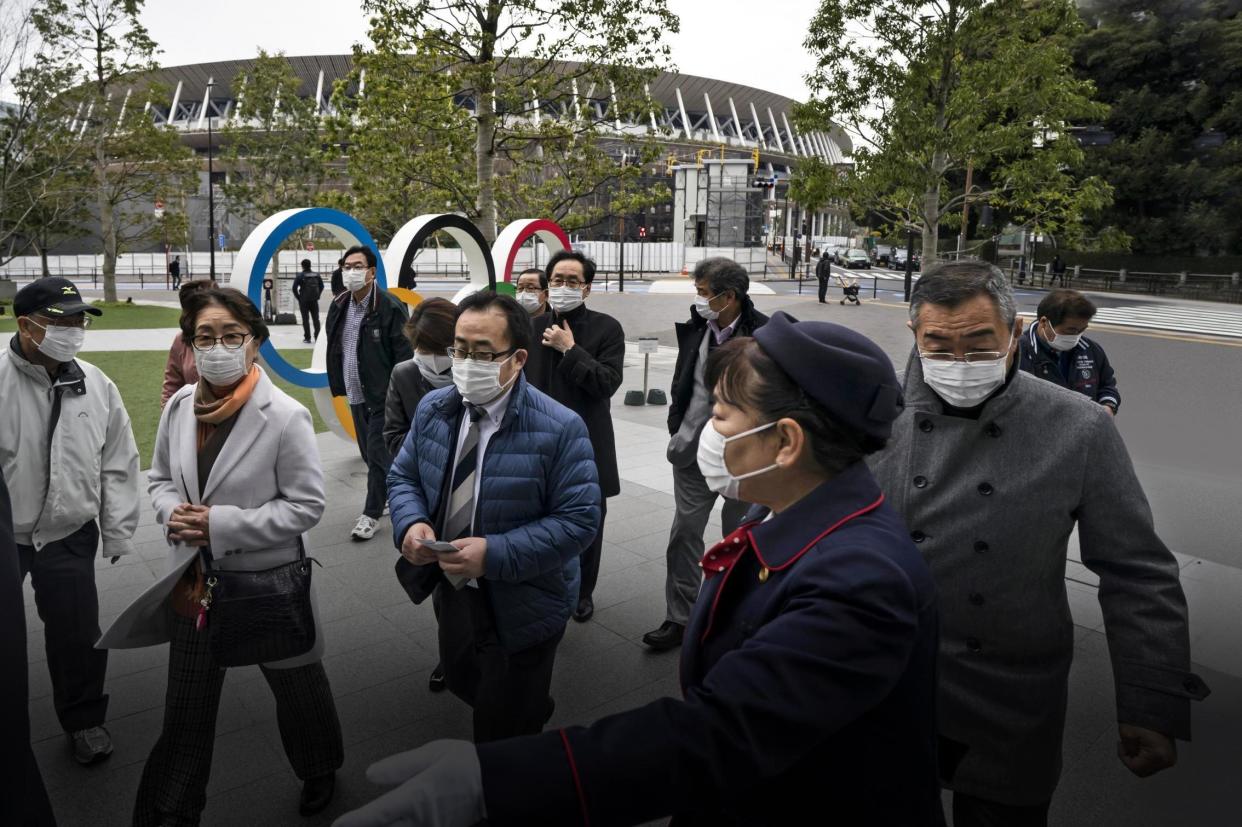How coronavirus could affect Tokyo Olympics: IOC bosses monitoring response in Italy and South Korea

Tokyo is no stranger to having the Olympics cancelled. In 1940, the Japanese capital was set to welcome the Games only for it to pull out two years early because of the outbreak of war.
Helsinki stepped in as host but those Games — and the subsequent ones in London four years later — were cancelled because World War II.
A move to London has been mooted this time around following the outbreak of the coronavirus but Christopher Dye, an epidemiologist at the University of Oxford who is well-versed on how the International Olympic Committee deal with disease, was quick to dismiss such a relocation.
“That’s a complete non-starter,” he said. But Tokyo officials and the IOC — having been bullish in their public protestation the Games willgo ahead as planned — are now entertaining contingency plans, such as relocating Olympic competitions to a number of venues worldwide.
Already, Japanese sport has fallen foul to the coronavirus — the Tokyo Marathon has been scrapped for non-elite runners and the J-League has suspended official football matches.
In addition, the baseball team Yomiuri Giants were planning to play their latest pre-season match in the city in frontof vacant stands this weekend, while the Japan Sumo Association were considering cancelling a major event in Osaka next month.
And on Wednesday Japan’s Prime Minister Shinzo Abe called on organisers of major sporting and cultural events over the next two weeks to consider cancelling or postponing them saying that period was “critical” with regards to the spread of the virus.
He said: “In view of large-scale transmission risks, we’ve requested organisers to cancel, postpone or hold sports and cultural events nationwide on a smaller scale than planned for the next two weeks nationwide.”
Formerly with the World Health Organization, Dye was part of a group making risk assessments for the IOC in the lead-up to the last Games, in Rio de Janeiro, over Zika.
“They will cast their minds back to Zika and how it will be handled,” he said. “The message is no panic, people stay calm. I’d say the same as Government officials, that there’s no reason to make any premature judgments at this stage whether the Games go ahead or not.
“There’s plenty of time, everyone’s invested in the Games heavily at this stage so what’s to be gained from pulling back? The virus is a flu-like winter phenomenon and July is a long way off.”
IOC member Dick Pound said cancelling the Games would only come into conversation should it turn into a pandemic. He added: “Only if there is the worst possible outcome of this virus and it becomes a real pandemic then we’d reluctantly say, well, that’s more important frankly than the Olympics.
“But we will do our very best to make sure you get your Olympic opportunity. And by the time we get to April, May and June, it may be a thing of the past.”
Dye says the IOC and the Japanese Government will look at the examples set in Italy and South Korea, in particular, in any Olympic planning with regards to the virus.
Both countries have seen a rise in cases and both opted for an approach of quarantine and cutting down on unnecessary travel.
Already from a sporting perspective, the Six Nations game between Italy and Scotland in two weekends’ time has been cancelled and England’s trip to take on the Italians in Rome the following weekend looks likely to follow suit.
“South Korea and Italy are real test beds for controlling the virus,” added Dye. “Both countries should mount relatively effective responses as they’ve got good quality health services. If they both fail, though, the virus escapes quite readily to other parts of the world.”
Tokyo is expected to host more than 11,000 athletes for the Games and the knock-on effect of cancelling the event could prove career ending for some of them, according to former cyclist Callum Skinner, who won gold and silver in Rio.

“If the Games were postponed or cancelled that would be an absolute disaster for the athletes competing,” said the 27-year-old Scot.
“Sportsmen and women time their peak very diligently and to have that upset by the coronavirus would be pretty devastating. That could very well change results if they decided to reschedule it.
“You could have a solution where it’s dealt with sport by sport. Already track cycling is a couple of hours outside of Tokyo, likewise the Marathon is well outside the city, which makes it easier to control the population.
“Any cancellation or postponement would be unprecedented. But Japan do host events extremely well. Look at the typhoons at the Rugby World Cup — they dealt with that okay. So, there’s a glimmer of hope there.”
The British Olympic Association, like the IOC, have continued along the lines of it being business as usual five months out from Tokyo, closely following World Health Organisation guidelines on the virus with regards to the Games.
And the British Athletes Commission said none of the athletes they represent have yet to raise any concerns over the spread of the virus.
Chief executive Mahdi Choudhury said: “We have full confidence in organisations like the BOA and we’re in close communication with them, UK Sport, the English Institute of Sport and the British Paralympic Association.
“I don’t think there’s real cause for panic at this point in time.”
Read more
Tokyo 2020 organisers calm over Olympics despite coronavirus threat
Laura Kenny ‘can do a Ben Ainslie’ and defy injury to win Olympic gold
Tokyo governor blasts 'inappropriate' claim London could host Olympics

 Yahoo News
Yahoo News 
